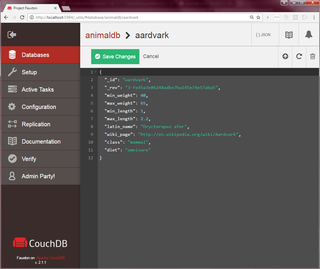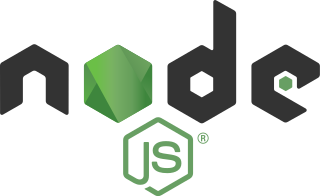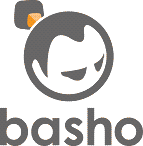Related Research Articles
In computing, a solution stack or software stack is a set of software subsystems or components needed to create a complete platform such that no additional software is needed to support applications. Applications are said to "run on" or "run on top of" the resulting platform.
Multi-master replication is a method of database replication which allows data to be stored by a group of computers, and updated by any member of the group. All members are responsive to client data queries. The multi-master replication system is responsible for propagating the data modifications made by each member to the rest of the group, and resolving any conflicts that might arise between concurrent changes made by different members.

Apache CouchDB is an open-source document-oriented NoSQL database, implemented in Erlang.
An embedded database system is a database management system (DBMS) which is tightly integrated with an application software that requires access to stored data, such that the database system is "hidden" from the application’s end-user and requires little or no ongoing maintenance. It is actually a broad technology category that includes
Dynamo is a set of techniques that together can form a highly available key-value structured storage system or a distributed data store. It has properties of both databases and distributed hash tables (DHTs). It was created to help address some scalability issues that Amazon.com's website experienced during the holiday season of 2004. By 2007, it was used in Amazon Web Services, such as its Simple Storage Service (S3).

Apache Cassandra is a free and open-source, distributed, wide column store, NoSQL database management system designed to handle large amounts of data across many commodity servers, providing high availability with no single point of failure. Cassandra offers robust support for clusters spanning multiple datacenters, with asynchronous masterless replication allowing low latency operations for all clients. Cassandra offers the distribution design of Amazon DynamoDB with the data model of Google's Bigtable.
A NoSQL database provides a mechanism for storage and retrieval of data that is modeled in means other than the tabular relations used in relational databases. Such databases have existed since the late 1960s, but the name "NoSQL" was only coined in the early 21st century, triggered by the needs of Web 2.0 companies. NoSQL databases are increasingly used in big data and real-time web applications. NoSQL systems are also sometimes called "Not only SQL" to emphasize that they may support SQL-like query languages or sit alongside SQL databases in polyglot-persistent architectures.

Redis is an in-memory data structure store, used as a distributed, in-memory key–value database, cache and message broker, with optional durability. Redis supports different kinds of abstract data structures, such as strings, lists, maps, sets, sorted sets, HyperLogLogs, bitmaps, streams, and spatial indexes. The project is developed and maintained by a project core team and as of 2015 is sponsored by Redis Labs. It is open-source software released under a BSD 3-clause license.

Node.js is an open-source, cross-platform, back-end, JavaScript runtime environment that executes JavaScript code outside a web browser. Node.js lets developers use JavaScript to write command line tools and for server-side scripting—running scripts server-side to produce dynamic web page content before the page is sent to the user's web browser. Consequently, Node.js represents a "JavaScript everywhere" paradigm, unifying web-application development around a single programming language, rather than different languages for server- and client-side scripts.
Riak is a distributed NoSQL key-value data store that offers high availability, fault tolerance, operational simplicity, and scalability. In addition to the open-source version, it comes in a supported enterprise version and a cloud storage version. Riak implements the principles from Amazon's Dynamo paper with heavy influence from the CAP Theorem. Written in Erlang, Riak has fault tolerant data replication and automatic data distribution across the cluster for performance and resilience.
Cloudant is an IBM software product, which is primarily delivered as a cloud-based service. Cloudant is a non-relational, distributed database service of the same name. Cloudant is based on the Apache-backed CouchDB project and the open source BigCouch project.
A cloud database is a database that typically runs on a cloud computing platform, and access to the database is provided as-a-service.

Amazon DynamoDB is a fully managed proprietary NoSQL database service that supports key-value and document data structures and is offered by Amazon.com as part of the Amazon Web Services portfolio. DynamoDB exposes a similar data model to and derives its name from Dynamo, but has a different underlying implementation. Dynamo had a multi-master design requiring the client to resolve version conflicts and DynamoDB uses synchronous replication across multiple data centers for high durability and availability. DynamoDB was announced by Amazon CTO Werner Vogels on January 18, 2012, and is presented as an evolution of Amazon SimpleDB solution.

Basho Technologies was a distributed systems company that developed a key-value NoSQL database technology, Riak, and an object storage system built upon the Riak platform, called Riak CS.
Apache Accumulo is a highly scalable sorted, distributed key-value store based on Google's Bigtable. It is a system built on top of Apache Hadoop, Apache ZooKeeper, and Apache Thrift. Written in Java, Accumulo has cell-level access labels and server-side programming mechanisms. According to DB-Engines ranking, Accumulo is the third most popular NoSQL wide column store behind Apache Cassandra and HBase and the 67th most popular database engine of any type (complete) as of 2018.
FoundationDB is a free and open-source multi-model distributed NoSQL database developed by Apple Inc. with a shared-nothing architecture. The product was designed around a "core" database, with additional features supplied in "layers." The core database exposes an ordered key-value store with transactions. The transactions are able to read or write multiple keys stored on any machine in the cluster while fully supporting ACID properties. Transactions are used to implement a variety of data models via layers.
RocksDB is a high performance embedded database for key-value data. It is a fork of Google's LevelDB optimized to exploit many CPU cores, and make efficient use of fast storage, such as solid-state drives (SSD), for input/output (I/O) bound workloads. It is based on a log-structured merge-tree data structure. It is written in C++ and provides official language bindings for C++, C, and Java; alongside many third-party language bindings. RocksDB is open-source software, and was originally released under a BSD 3-clause license. However, in July 2017 the project was migrated to a dual license of both Apache 2.0 and GPLv2 license, possibly in response to the Apache Software Foundation's blacklist of the previous BSD+Patents license clause.

In computing, Hoodie is an open-source JavaScript package, that enables offline first, Front-end web development by providing a complete backend infrastructure. It aims to allow developers to rapidly develop web applications using only front-end code by providing a backend based on Node.js and Apache CouchDB. It runs on many Unix-like systems as well as on Microsoft Windows.

Scylla is an open-source distributed NoSQL column-oriented data store. It was designed to be compatible with Apache Cassandra while achieving significantly higher throughputs and lower latencies. It supports the same protocols as Cassandra and the same file formats (SSTable), but is a completely rewritten implementation, using the C++20 language replacing Cassandra's Java, and the Seastar asynchronous programming library replacing threads, shared memory, mapped files, and other classic Linux programming techniques. In addition implementing Cassandra's protocols, Scylla also implements the Amazon DynamoDB API.
TiDB is an open-source NewSQL database that supports Hybrid Transactional and Analytical Processing (HTAP) workloads. It is MySQL compatible and can provide horizontal scalability, strong consistency, and high availability. It is developed and supported primarily by PingCAP, Inc. and licensed under Apache 2.0. TiDB drew its initial design inspiration from Google's Spanner and F1 papers.
References
- ↑ "The Future of Apache CouchDB" . Retrieved 5 January 2012.
- ↑ "Welcome BigCouch". Apache CouchDB blog. 25 July 2013. Retrieved 16 November 2015.
- ↑ "BigCouch is no longer supported by Cloudant". Cloudant GitHub. 24 June 2015. Retrieved 16 March 2018.
- ↑ "Dynamo: Amazon's Highly Available Key-value Store". Archived from the original on 21 February 2011. Retrieved 15 January 2011.
- ↑ "Cloudant's BigCouch is open-source". Archived from the original on 1 September 2010. Retrieved 19 January 2011.
- ↑ "ScalingOut CouchDB with BigCouch". Archived from the original on 19 December 2010. Retrieved 15 January 2011.